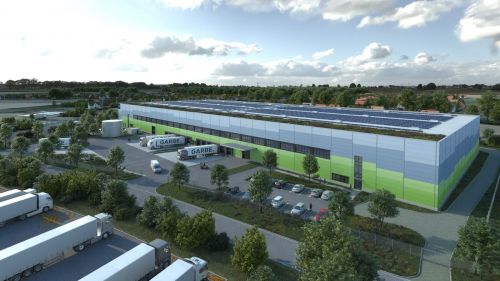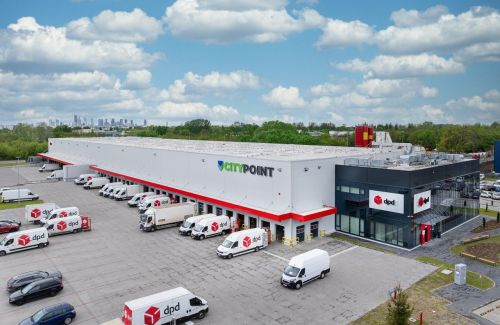Your flexible friend, the landlord
New technology
Rafał Ostrowski, ‘Eurobuild Central & Eastern Europe’: One of your predictions for the property market of tomorrow is that investors will no longer be able to use their investments the same way they would use bonds, that is, as income-
generating products. Why do you think this will happen?
Antony Slumbers, consultant on the impact of technology on the property market: Typically, at the moment the job of the landlord or developer is to buy or build a building, lease it out to a company for as long as possible, and then sell the investment. The investment, broadly speaking, is treated as a bond, which gives you a certain yield, because you know how much money in ten years the company that rented the space is going to give you. This world for much of the market has now gone. It only really still exists for the top of the market or larger firms. I think for most companies, with under app. 1,000 sqm, you need to be starting to think that your job as a landlord is to convince them to come into your property every single day. Because it’s going to be the case that they will be able to lease the office for a day or a month or for six months and they can leave whenever they want. So you will have to keep providing them with a really good service.
That’s a daunting prospect for investors, isn’t it?
It’s daunting if you’re not good at it. But it’s wonderful if you are. Why is WeWork theoretically worth around USD 20 bln? Because people are prepared to pay them so much for a desk. People feel that going into a WeWork office gives them what they need to an extent that they are prepared to pay more for it. We can take the iPhone as an analogy. The iPhone has 18 pct of the global smartphone market, generating 88 pct of all the profit. So it has a small market share but makes most of the profit. How does it do that? Because they have managed to marry hardware and software to create a user experience and a brand that their customers are prepared to pay way too much money for. But they are still happy to do so.
Isn’t real estate a stable asset? That’s what it always used to be.Well, it is and it isn’t. It is, but perhaps in different ways to how it was previously. The way I see it, across much of the market we are heading for a world where there is less real estate but it’s better. So if you take retail for instance. We have had too much retail in the UK. I think there is going to be a lot less retail, maybe 25 pct to 30 pct less, but it’s going to be much better. Because retail used to be a distribution channel. It was where you used to have to go to purchase your goods. But you obviously don’t need to do this anymore because you can purchase them online. So what’s the point of retail? Well, the only point of retail is either the things I need every day and they are all too cheap to ship, or it’s the things that I experience – that is the fun, the whole theatre of retail. Otherwise I am perfectly comfortable sitting on my sofa and asking Amazon to deal with it all. So I think what you’re going to get is that in some ways the good things will become more resilient – and the same is going to happen with offices to some extent.
The impact of e-commerce on retail has become obvious in recent years, but why are you saying that a similar thing will happen to offices?
Offices have the same characteristics as retail real estate in the sense that just as we don’t need a shop to do our shopping, we don’t need an office to go to work in any more. So you have to want to go there for different reasons. The quality of your office and the quality of the operator of your office space are going to become increasingly important, because you don’t want to go there for five days a week and nine hours a day. You are going to do your added value work. So the people who can provide you with great space that enables you to be as productive as possible will have to be very resilient, because even during downturns, good companies with good workers will want to be in good premises – space that actually adds value. All the space that you could do without, that you don’t really need and doesn’t add anything to the value, will become less resilient. In reality no company actually wants to have an office – what they really want is a productive workforce. A significant component of that is the space you work in. It’s not just your space, it’s the other amenities the building has. A great deal of the focus is on reducing energy, rent and water costs. And all of that is nothing compared to the costs of having all these people inside your building. So if you are a landlord and you can make your occupier 1 pct more productive, you can be very, very resilient.
How can you achieve that?
I call it switching from being a rent collector to a service provider. For most landlords the client is the person who signs their cheque four times a year. That is a completely different world to being a service provider where your customer is every single person that walks into your building. But if you read the research, on average only 50 pct of people say their office makes them productive. The game with flexible offices is how to get 80 pct of people to say that my space makes them productive. You also want to encourage people to actually use less space, because the argument flips around. In a bonds-type of world, you want people to take as much space as possible for as long as possible. In a short term world I would be much better leasing you 500 sqm, which you could use intensively, and then if you wanted a meeting room, I’ve got a meeting room you can use. And then you might need some event space or some catering space – and I’ve got that too. And so instead of you splashing out on 1,000 sqm, I want you to take 500 sqm but you give me 700 sqm of cost spread. So you still save money, but you are paying a lot more per sqm.
Is it really true that the office is dead?
Well, yes and no. The traditional office is dead. The office in the sense of: here it is, it’s grey, it’s dull and there are lots of desks lined up. I think that is now completely obsolete.
Is it gone for good or just for now?
This is not a binary thing. It’s like people saying “I don’t like remote working, I need it to be face-to-face.” No one is ever saying you have to do one or the other. There has to be a blend – and I think it’s the same with real estate. You will get the biggest companies doing their own thing and they will still sign long leases. They might sign a lease for 10,000 sqm instead of 15,000 sqm and then use bits of other space. There are still an awful lot of people and an awful lot of businesses that are particularly dependent upon office workers in more process driven businesses. There is still a huge market for very boring offices out there somewhere. But I’m thinking really of the central business districts in major cities. They need the biggest pool of highly trained, highly skilled employees, and such employees have options nowadays. They are in demand – abnormally so – and will go where the workplace matches their requirements.
Is it possible to design and build offices and buildings that are future-proof?
The mantra everyone in software lives by is: build, measure, learn. Develop something, see what works, see what doesn’t, change it and keep going. People in real estate get hung up by the worry that the workplace world is all about “oh, my workplace didn’t work perfectly.” In the software world no one cares. They know it isn’t going to work. You can’t think that it will. No piece of software survives its first meeting with a customer. They will say, “oh, I don’t like it.” Or they’ll use it in a different way than you designed it for. And people are going to do that with your office space. You’ve got to really understand how your building works, but you also need to understand what the changing needs of your customer are. It has to move away from being a business where you say: you need a new workplace, I’ll give you a quotation, it’s going to cost you this, I’ll install it and then I’ll go away. A workplace has to be an ongoing partnership between companies. This again involves a shift from a product type way of thinking to a service way of thinking.
How will artificial intelligence change the game?
In one presentation I have a slideshow that looks into seventeen different areas of real estate, each of which uses a different type of AI. I think a great deal of work will need to be done in terms of investment analyses to understand better the portfolios of investment companies. What type of properties are used, what’s the profile of these companies, which areas they are in, and what are the demographics and psychographics of these areas. This will provide you with much more of an understanding of a location than just saying “oh, that’s mainly 18 to 53 year olds who live there.” If it gives you such statistics as whether there are many restaurants in an area – then that will tell you something; but it would tell you much more if you told you what types of restaurants are there and their price range. So AI is primarily likely to be used for investment analyses and understanding locations better.
Antony Slumbers was a keynote speaker of the Human Centered Places conference, which was organised in June by Colliers International in Warsaw.

Katarzyna Tasarek-Skrok, an associate director in the office space department at Colliers International
The impact of co-working is still only minor – for now
We have been seeing increased activity from new operators offering co-working space services on the Polish market for a few years now. They are attractive not just to start-ups but also large corporations seeking the kind of space that will inspire their employees. The strength of co-working companies stems from their flexibility, modernity and efficiency in the office space field as well as the way they think about work. In an era when it is a struggle to attract the most talented personnel, co-working space may turn out to be quite an interesting solution to this dilemma. A hot topic on the real estate market today is the question of what kind of impact co-working space might have on the investment market. At the moment, any such impact has been minor. So far co-working companies operating on the Polish market have resisted signing contracts other than those for a definite period of time, such as 5, 7 or 10 years. The cost of fitting out co-working space is very high, which is why these types of offices are among the most expensive on the market. Securing fixed-term contracts is therefore one of the safeguards employed by the owners of co-working space. Furthermore, developers in Poland are rather sceptical about the idea of making the rent for the space leased to a co-working firm dependent on its potential revenue, in other words – they don’t want to participate in the business of their tenants. But such approaches have been adopted in other capital cities, such as London and New York. The phenomenon of co-working companies becoming direct competition for developers and – just like them – offering office space within the same complex, is a marginal issue but interesting nevertheless. How will developers react in such a situation? Only time will tell, but we will certainly be witnessing some important changes on the real estate market.
Pioneer of a digital world
Antony Slumbers is the founder of several real estate software companies and a consultant on the influence of technology on the property market. In 1995 he founded Estates Today, which has run the global websites of major industry players, such as King Sturge. The company runs a commercial real estate research website, www.cityoffices.net, which provides commercial property news and details of major office developments in London and other city centres. Antony advises companies on the development of new software products and helps real estate companies to develop strategies to thrive in a digital world. He is a speaker at international events and writes regularly for trade magazines. He is ranked at number 52 on Duke Long’s 2018 Global #CRE and #TECH Power 100 list, as well as at number 3 on Lendinvest's PropTech Power List 2017. He is a member of the leadership board of the CRETech website and a mentor at the MetaProp RE200 accelerator programme.





















































